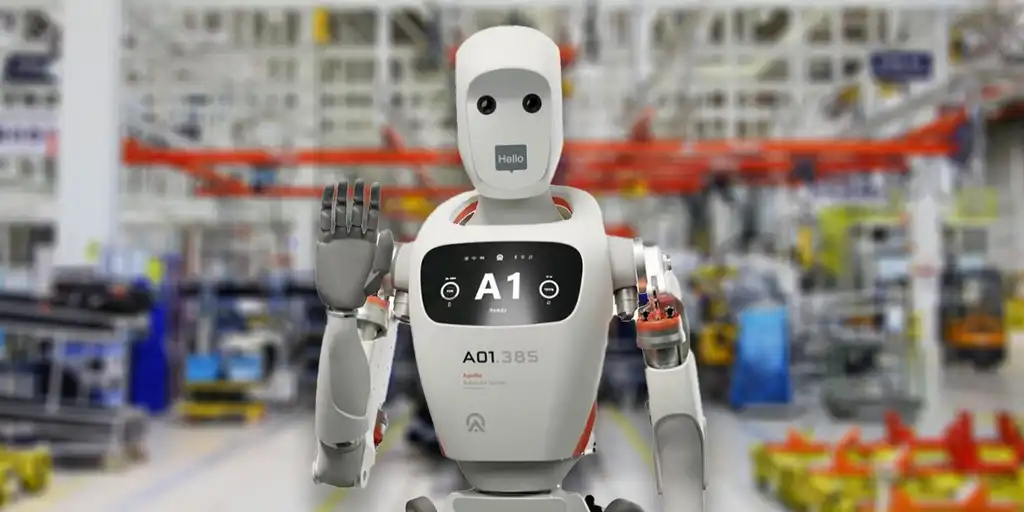Mercedes-Benz collaborates with Apptronik to introduce AI-powered robots into its factories, aiming to automate low-skill manual tasks. Explore the impact of AI in automotive manufacturing.
German automaker Mercedes-Benz has forged a collaboration with Apptronik, an AI company based in Austin, to integrate artificial intelligence into its factory robots, the firms announced on Friday.
This partnership marks Apptronik’s inaugural commercial agreement to deploy its Apollo robots in real-world scenarios, particularly within the automotive sector. The company originated from the Human Centered Robotics Lab at the University of Texas at Austin back in 2016.
"The agreement with Mercedes-Benz represents a significant milestone for us as we introduce Apollo to the automotive industry," remarked Jeff Cardenas, the CEO and co-founder of Apollo, in a press release.
Apollo robots are designed with humanoid features, standing nearly six feet tall, weighing 160 lbs, and capable of lifting up to 55 lbs. These robots boast a battery life of four hours and can either be stationed statically or equipped with legs for mobility. Equipped with LED lights in their heads and chests, Apollo robots can convey their operational status, such as charging and data processing activities.
Mercedes-Benz intends to utilize Apollo robots for automating tasks characterized by low-skilled, physically demanding, and repetitive manual labor, as elucidated by Cardenas. He believes that this application serves as a blueprint for other organizations to emulate in the forthcoming months and years.
Introducing humanoid robots into factory settings enables companies like Mercedes-Benz to leverage existing human-centric infrastructure, obviating the need for extensive spatial redesigns.
With the proliferation of AI across various sectors, policymakers and ethicists are increasingly apprehensive about the potential displacement of human workers by emerging technologies, whether in intellectual domains or vocational trades. Moreover, there are concerns that AI adoption could lead to reduced investments in human resources by employers, even if jobs are retained.
Mercedes-Benz views its collaboration with Apptronik as a pilot initiative aimed at evaluating its potential implications.
"We are delving into new horizons by exploring the integration of robotics to augment our skilled workforce in manufacturing," stated Jörg Burzer, a board member at Mercedes-Benz. "This represents uncharted territory, and we are keen on comprehending the ramifications for both robotics and automotive manufacturing."
At the time of reporting, Decrypt had not received a response from Apptronik regarding their input on the collaboration.
The ongoing replacement of humans by machines in the workplace has become a persistent concern, particularly with the rapid advancement of artificial intelligence technologies.
"Much of the current investment in companies like Figure stems from the aspiration that these technologies can effectively integrate into existing workflows," remarked Ken Goldberg, an Industrial Engineering Professor at UC Berkeley.
While the spotlight often shines on generative AI models like OpenAI’s ChatGPT and Anthropic’s Claude AI, humanoid robots equipped with AI capabilities are swiftly emerging as significant players in the technological landscape. Goldberg emphasized the importance of various factors in determining the feasibility of humanoid robots, citing the example of mobility mechanisms such as wheels versus legs.
"Wheel-based mobility can pose challenges in domestic environments, particularly with obstacles like carpets and stairs," Goldberg noted. "Conversely, legged mobility holds promise in such settings, and we anticipate significant advancements in this domain within the next decade."
Several companies, including Hanson Robotics, Tesla, OpenAI-backed 1X, and Honda, are actively developing robots tailored for mass production to operate in hazardous environments such as outer space.
Figure AI, headquartered in Silicon Valley, recently unveiled its Figure 01 robot, leveraging OpenAI’s technology to engage in autonomous conversations, identify food items, and concurrently perform cleaning tasks.

